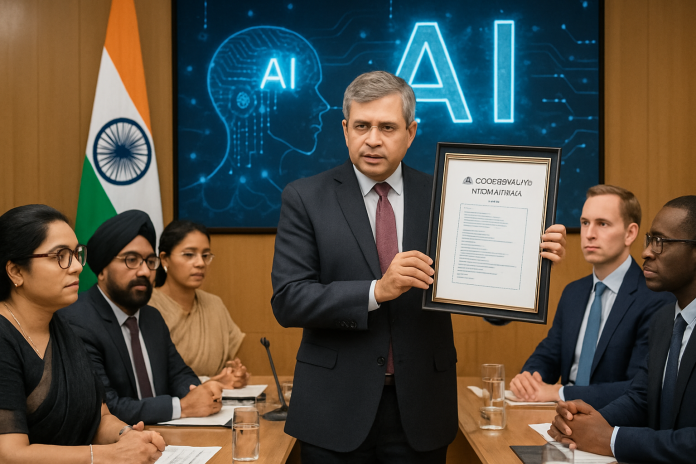Quick Take
- India releases comprehensive AI governance framework September 28, 2025 following 3000+ stakeholder consultations
- Framework establishes safety boundaries without full prescription, allowing future legislative evolution
- AI Impact Summit 2026 positions India as global leader in AI regulation discourse
- Initiative aligns with EU AI Act and OECD principles while addressing deepfakes and synthetic content
India charts new course in AI regulation with landmark framework
India is set to reshape its approach to artificial intelligence oversight with the September 28, 2025 rollout of a sweeping governance framework that aims to strike a careful balance between innovation and safety. The government’s initiative represents what officials describe as one of the most comprehensive consultation efforts in global AI policy history, drawing input from more than 3000 stakeholder engagements spanning industry leaders, academic institutions, and civil society groups.
IT Minister Ashwini Vaishnaw stressed the framework’s measured approach during recent policy briefings.
“We have conducted over 3000 consultations to ensure this framework is comprehensive and accommodating,” Vaishnaw noted, underscoring the administration’s focus on developing inclusive policies that shield citizens from AI risks while avoiding barriers to technological progress.
Framework Takes Flexible Approach to Emerging Technology
The governance structure intentionally steers clear of rigid requirements, choosing instead to create adaptable safety guardrails that can mature into formal legislation as AI technology continues to evolve. This responsive strategy gives India the ability to tackle new AI challenges while providing clear guidance for companies and developers working within the country’s borders.
Vaishnaw detailed India’s coordination with global AI governance initiatives, noting similarities to the EU’s AI Act and OECD AI Principles.
“The question of dealing with AI-generated content is indeed a pressing one. Our framework aims to address these head-on,” he said, pointing to mounting concerns about synthetic media and deepfakes that will take center stage in coming policy debates.
AI Impact Summit 2026 Puts India on Global Stage
The February 2026 AI Impact Summit will present India’s regulatory approach to international observers, with Prime Minister Narendra Modi set to open the gathering. The conference establishes India as an influential player in worldwide AI governance discussions, especially concerning synthetic content oversight and international AI safety coordination.
The schedule dovetails with India’s wider digital policy agenda, including new regulations under the Digital Personal Data Protection Act and online gaming oversight measures. These parallel efforts show the government’s holistic strategy for managing digital transformation challenges while encouraging technological advancement across various industries.
Tackling Synthetic Content and Deepfake Concerns
The framework places special emphasis on AI-created synthetic content and deepfakes as key regulatory priorities. Minister Vaishnaw recognized these technologies create substantial hurdles for content verification, privacy safeguards, and social cohesion in India’s fast-changing digital landscape.
Primary areas of focus include setting “AI harm” standards, creating transparency rules for AI systems, and building responsibility frameworks for AI creators and operators. The structure seeks to maintain innovation rewards while ensuring citizen safety, particularly in high-stakes areas like healthcare, financial services, and education where AI use carries greater social consequences.
Timeline and Business Implications
The September 28 launch gives Indian companies and multinational firms with operations in India concrete regulatory schedules for compliance preparation. The framework’s flexible design provides room for industry adjustment while setting fundamental safety standards across AI deployments.
Simultaneous work on DPDP Act regulations and online gaming rules builds a complete digital governance structure that covers data protection, content oversight, and algorithmic responsibility under one policy umbrella.
India’s strategy mirrors increasing worldwide agreement on AI governance that encourages innovation while safeguarding basic rights and social order. The thorough consultation process and international coordination position the framework as a possible blueprint for other developing nations facing similar AI regulatory decisions.






